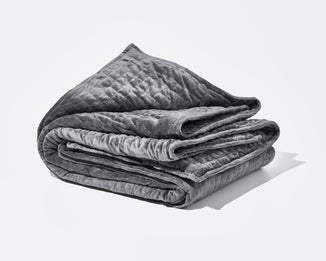
Mar 21, 2022
What Is Sleep Debt? Everything You Need to Know
We’ve all been there before. It’s 2 a.m. and you’re still binge-watching Netflix, trying to catch up on the latest season of Stranger Things or The Crown. You finally close your laptop at 2:30 a.m. and snuggle up to your weighted blanket, trying not to count down the hours until your alarm clock goes off.
The morning after a poor night’s sleep can be rough. Research shows that even one night of sleep loss can significantly impair daily functioning, causing harmful effects on metabolism, memory, reaction time and more. But the real danger, experts warn, is making a habit out of cutting short your sleep. That’s when your sleep debt starts to rise — and the risk of serious health conditions along with it.

What Is Sleep Debt?
In case you didn’t already figure it out, sleep debt is the difference between the sleep you get and the sleep you need. For example, let's say you need seven hours of sleep each night, but only manage to get five. In this scenario, your sleep debt would be two hours.
Now, you may be thinking, “two hours of sleep debt doesn’t seem too bad.” And if this were a one-off case, you would be absolutely right! But let’s imagine a scenario in which you miss two hours of sleep every night for the next two weeks. By the end of those two weeks, you would already have racked up a sleep debt of 28 hours!
Can You Ever ‘Catch Up’ on Sleep Debt?
Sleeping in on the weekends is one of America’s favorite pastimes. But can hitting the snooze on a Saturday really cancel out some of the health risks associated with insufficient sleep? The unsatisfying answer is that we still don’t know.
In a 2018 study published in the Journal of Sleep Research, Swedish researchers looked at 13 years of data and concluded that getting longer sleep on the weekends may help compensate for shorter sleep on the weekdays. However, another study came to the opposite conclusion. They found that making up for lost sleep on the weekend didn’t undo the metabolic dysregulation associated with insufficient sleep.
Some experts say that it’s possible to catch up on sleep, but the process may take a long time. In a 2016 study published in Scientific Reports, researchers found that a person needs four days of adequate sleep to make up for one hour of sleep debt.
The bottom line? Catching up on sleep may reverse some of the harmful effects of sleep deprivation, but you’re far better off sticking to a regular bedtime schedule and prioritizing your sleep.

How Can You Avoid Sleep Debt?
The National Sleep Foundation says that most healthy adults should aim to get seven to nine hours of shut-eye each night, but most of us are falling woefully short of this number. Below are a few strategies you can use to avoid racking up excessive sleep debt.
1. Keep consistent bed and wake times
Adhere to a consistent sleep schedule (yes, even on the weekends). Keeping consistent bed and wake times helps maintain the timing of the body’s internal clock, which is necessary for achieving quality sleep.
2. Create a relaxing pre-bed routine
Are you struggling to fall asleep at your preferred bedtime? Make time for relaxing activities before bed, such as reading or listening to a meditation podcast. For maximum relaxation before bed, consider cuddling up to our top-rated Gravity Weighted Blanket, which uses the power of “deep touch pressure stimulation” to promote a sense of calm and contentment.
The benefits of weighted blankets are vast. Beyond being a cozy way to relax after a long day, wrapping yourself in a weighted blanket in the evening can help you fall into a faster and deeper sleep!
Get Your Gravity Weighted Blanket

3. Optimize your light exposure
Light has a significant impact on your circadian rhythm. To improve your nightly slumber, try to expose yourself to bright sunlight first thing in the morning. Limit your exposure to artificial lighting at night.
4. Watch your diet
Everyone knows that caffeine and sleep don’t mix, but you may be surprised to learn that spicy foods, high-carb foods and highly acidic foods (think oranges and lemons) can also sabotage your sleep efforts. Other food and drinks to avoid at dinner: dark chocolate, which contains caffeine, and alcohol.
5. Set a nightly screen time limit
Everything is better in moderation, and that includes your screen time. If your binge-watching habit is interfering with your sleep, disable the autoplay feature on your favorite streaming services and allow yourself a certain amount of screen time for your digital devices.
Time to Turn Over a New Leaf
While you may not be able to catch up on years’ worth of lost sleep, you can start turning things around today by making sleep a top priority. At Gravity Blankets, we’re committed to helping you get your best sleep ever. Cozy up to one of our high-quality weighted blankets and experience the calming effects for yourself!
Sources:
https://www.healthline.com/health/dr/sleep-deprivation/sleep-debt
https://www.sleepfoundation.org/how-sleep-works/sleep-debt-and-catch-up-sleep
Your use of this website, its content, and any products obtained through this website is at your own risk. This website, its content, and any products obtained through this website are provided on an “as is” basis, without any warranties of any kind, either express or implied, including warranties of merchantability, infringement of intellectual property, or fitness for any particular purposes. No warranty or representation is made with respect to the completeness, reliability, quality, or accuracy of this website or its content. This website, its content, and any products obtained through this website do not constitute medical treatment and is not a substitute for a medical examination or diagnosis. If you are dealing with a health condition check with your health care provider before using. This website may contain affiliate links that allow us to earn a commission on purchases made through such links. We may accept forms of advertising or sponsorships in connection with this website. There might also be paid topic insertions. We may accept and keep free products, services, and other forms of compensation from others.



